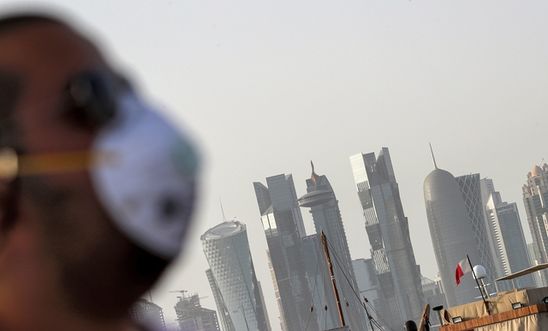
Press releases
Qatar: migrant workers in overcrowded camps at grave risk from COVID-19

Workers in Doha’s Industrial Area reportedly in lockdown
Social distancing impossible in cramped, unsanitary accommodation camps
‘Migrant workers trapped in camps … are at particular risk of exposure to the virus’ - Steve Cockburn
Responding to reports that parts of Qatar’s Industrial Area in Doha - home to a large number of migrant workers living in accommodation units - have been put into lockdown after hundreds of construction workers became infected with COVID-19, Steve Cockburn, Amnesty International’s Deputy Director of Global Issues, said:
“As the world struggles to contain the spread of the COVID-19 pandemic, migrant workers trapped in camps such as those in Qatar are at particular risk of exposure to the virus.
“Qatar’s labour accommodation camps are notoriously overcrowded, and a lack of adequate water and sanitation means that workers are inevitably less able to protect themselves from the virus. Workers’ proximity to one another in cramped camps also does not allow for any type of social distancing.
“The Qatari government must ensure that human rights remain central to all attempts at prevention and containment of the COVID-19 virus, and also that all people have access to healthcare, including preventive care and treatment for everyone affected, without discrimination.”
Amnesty is calling on Qatar and other Gulf countries to ensure that migrant workers’ rights are not further marginalised during this crisis, that they can access sick pay when they are unable to work because of the COVID-19 epidemic, and that they have access to healthcare.
Overcrowded, poorly-maintained camps
During the course of its research in Qatar, Amnesty has visited labour camps in Doha’s Industrial Area where large groups of migrant workers were housed in very poor accommodation, sleeping in bunk-beds in overcrowded rooms, with poor sanitation and sometimes with no electricity or running water.
Since 2010, when Qatar was awarded the right to host the 2022 FIFA World Cup, Qatar’s migrant worker population has expanded very rapidly. Coming from some of the world’s poorest countries, and working in sectors including construction, hospitality and domestic service, migrant workers now make up 95% of the country’s labour force.
Amnesty has repeatedly documented concerns about the rights of migrant workers in the Industrial Area, and over Qatar’s exploitative “kafala” employment system.